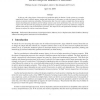Free Online Productivity Tools
i2Speak
i2Symbol
i2OCR
iTex2Img
iWeb2Print
iWeb2Shot
i2Type
iPdf2Split
iPdf2Merge
i2Bopomofo
i2Arabic
i2Style
i2Image
i2PDF
iLatex2Rtf
Sci2ools
103
click to vote
CONCURRENCY
2006
2006
An efficient memory operations optimization technique for vector loops on Itanium 2 processors
To keep up with a large degree of instruction level parallelism (ILP), the Itanium 2 cache systems use a complex organization scheme: load/store queues, banking and interleaving. In this paper, we study the impact of these cache systems on memory instructions scheduling. We demonstrate that, if no care is taken at compile time, the non-precise memory disambiguation mechanism and the banking structure cause severe performance loss, even for very simple regular codes. We also show that grouping the memory operations in a pseudo-vectorized way enables the compiler to generate more effective code for the Itanium 2 processor. The impact of this code optimization technique on register pressure is analyzed for various vectorization schemes. keywords Performance Measurement, Cache Optimization, Memory Access Optimization, Bank Conflicts, Memory Address Disambiguation, Instruction Level Parallelism.
Cache Systems | CONCURRENCY 2006 | Instruction Level Parallelism | Memory Disambiguation Mechanism |
Related Content
| Added | 11 Dec 2010 |
| Updated | 11 Dec 2010 |
| Type | Journal |
| Year | 2006 |
| Where | CONCURRENCY |
| Authors | William Jalby, Christophe Lemuet, Sid Ahmed Ali Touati |
Comments (0)

